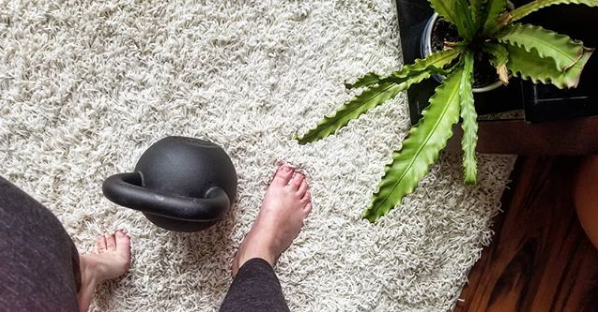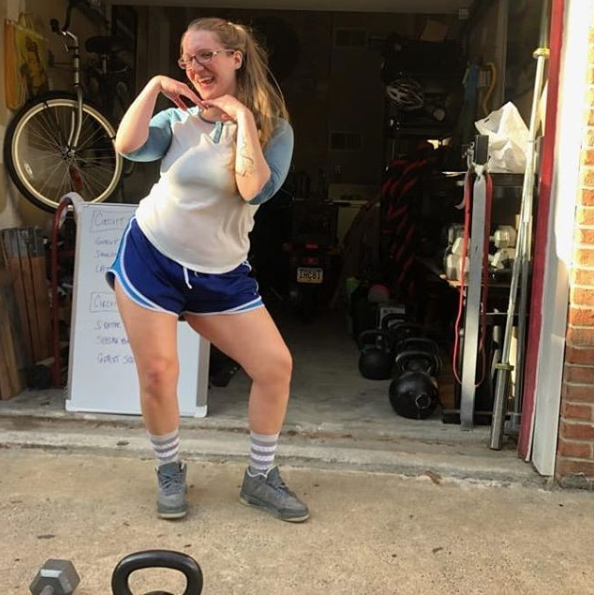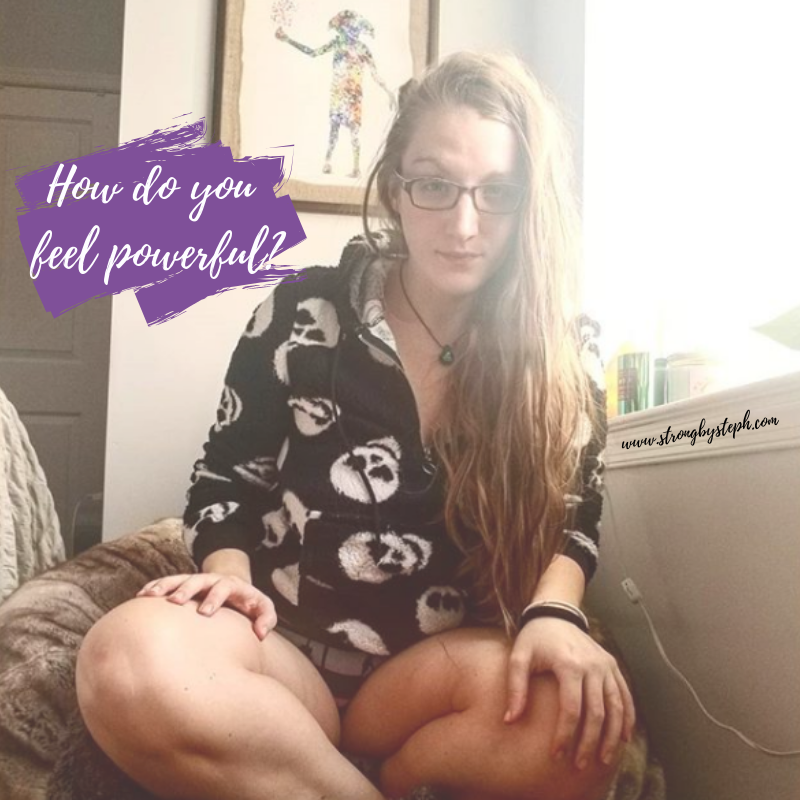So, you're sitting there, mid-February, having abandoned all notions of resolutions, thinking about the hike you took this weekend and the dinner you're cooking later, wondering why you didn't allow yourself some space for freedom sooner. When all of a sudden you hear chatter creeping up, wafting through the breeze like the smell of city trash in the summer: your coworkers are on their way to the break room, making one self-deprecating comment after another about how they've "failed" already, and they sit down to join you. You're having a tough time listening without
a) ripping your hair out or flipping a table
and/or
b) feeling pulled back into the diet culture soup.
But of course you don't want to do either of those things, and you can't just leave, because you've been trying to be friendlier at work. Why do you always find yourself in these situations?
All in feminism
What Is Weight Stigma? (And What Can You Do About It?)
It’s important, here, to acknowledge weight stigma harms all of us, and it harms the most marginalized among us (e.g., womxn of color who are fat, of lower socioeconomic status, and/or trans) most of all.
While it may seem a far-fetched conclusion if you’ve never experienced it firsthand, the effects of weight stigma are very real, and often show up in pronounced ways in healthcare and medical settings (which is why it has a place here, in fitness—the “average” sized womxn IS “plus size,” and part of helping someone with their health is treating them with compassion and respect, in my book). We often hear rhetoric about , “glorifying ob*sity,” and being a burden on the healthcare system, but the reality is most folks are simply trying to live and navigate an environment and a culture actively opposed to their existence (see: Today’s Dietitian for a thorough article on the prevalence of weight stigma, internalized vs experienced stigma, the health effects of weight stigma (especially in healthcare — a 2017 study found that doctors are the #1 most common source of weight-based stigma!), social media, and more).
Does It Feel Like, "Loving Your Body," Is Only For Other People?
I know many people who wake up every morning, and right before they look in the mirror to greet themselves for the day, they feel pure terror. Dread. Fear. We steel ourselves up to brace for the, "flaws," someone else has told us will be there, and we wonder how, "bad," they look that day, and the chorus starts:
"Ugh, gross."
"I can't wear that. Do I have any clean, flowy tops?"
"I'm giving a presentation today; will this hold across my chest?"
"I shouldn't have eaten ____ last night. I never get this right."
We've discussed it before, but it bears repeating: the language you're using has a measurable impact on your perspective.
Many clients come to me unhappy with their bodies, desperately hoping that the program I present will hold all the secrets to body change, and, as a result, happiness. They're disappointed to find out that it doesn't always work that way, and, in fact, countless repeated incidents of this led me to examine my coaching philosophy, such that I no longer coach with a focus on intentional fat loss.
Liking our bodies (and ourselves) is an inside job, one that can't be completed in an hour a day at the gym and a salad every night for dinner. It's a practice, and it often feels unreachable: how many times have you asked yourself, "how do I go from hating everything about my body to loving it? LOVING it?"
It seems a million miles away for a lot of us. It did for me.
Why I Don't Believe in the, "No Excuses" Movement
When I decided to become a coach, I realized, first and foremost, this sort of trust was vital to the success of everyone involved: if I can't humble myself enough to listen—deeply and fully—or to understand that at any given moment you may be having an entirely different experience and perception of our interaction and/or environment than I do (and believe you about your experience), then am I really being of service?
Am I really helping you along with your goals?
Does this change when your goals are different from my goals?
Or when they're different from the goals other people have, or have had in the past?
Seems quite basic, when you put it that way, but I haven't always hit the mark, and I find time and again, as I both get to know coaches further and have hired some myself, we could all use work, here. Not being understood seems to be a common experience of the human condition, especially in fitness.
Why You're Hung Up on Your, "Summer Body"
During warmer weather in particular, we hear all about, "summer bodies," and, "getting ready," and all sorts of things implying that our bodies aren't enough as is, and, when we inevitably buy into it, we're often left with less money and more frustration than when we started, plus a heaping helping of shame.
Body image issues are logical: they don't come from nowhere, and nothing is wrong with you if you struggle to love your body.
(In fact, I'd argue that, "loving your body," isn't really the point, here; it's to think if your body less, so that you can be more of who you are, other than your body.)
And, the first step, for so so so many womxn I coach, is to recognize, while your body is certainly all yours and you can do whatever you choose with it (or you should be able to, anyway), perhaps (juuuust maybe), your thoughts on your body are not entirely your own.
If You're Tired of Trying to, "Love Your Flaws," You're Not Alone. There's More to This.
We won't be talking about, "loving your flaws," here, for quite a few reasons, but perhaps the most universal one?
I don't think that's a goal you really have, when we get down to it.
I don't think it would make you feel good to pick on some body part you've been told needs to be fixed, agonize in the mirror over it every morning to keep it top of mind all the time, only buy clothes that cover it up, and somehow be totally hype about it anyway.
It doesn't make sense.
Marketing to you that way is dishonest, IMO.
On Perfectionism (Ever Felt Like You're, "Too Much?")
Hello from the exact moment the maintenance man knocked on our door to fix our washer/dryer that had locked wet clothes inside for a full day (if you follow me on Instagram, you may remember this series of stories I put up, trying to crowdsource solutions), when Leonidas WAS NOT HAVING IT.
I learn lessons from this dude all the time.
How (One Way) to Say No
ABOUT THIS EXPRESSION I MAKE:
100% of the time, I adopt this hands-under-chin situation when I have just delivered information that is likely unwelcome and/or at least slightly uncomfortable to its target.
This being the circumstance, I could not be more thrilled my friend Jen captured this on film, at our weekly #neighborhoodworkoutgroup.
ITEMS THAT HAVE PRECEDED THIS POSE:
⚡ "I can't do that for you."
⚡ "This is hypocritical."
⚡ "I need more support."
⚡ "Do you see how this is problematic (fatphobic, racist, misogynistic things have all made appearances here)?"
⚡ "This is out of alignment with my values."
⚡ "I disagree."
⚡ "No."
⚡ "🎶 nooooo 🎶" (in song)
(The context for many of these situations is wonderfully sticky, nuanced, and sassy conversation, as most of the things I'm into often are. Other stories for other days.)
All statements good to practice saying, particularly in a culture urging us, as womxn (the marginalized experience to which I can speak directly, but, for sure, this is exponentially compounded for others), to be quiet, to acquiesce, to carry the burden, to solve and fix and nurture.
I Ripped My Pants: 3 Tips to Deal with Clothes that Don't Fit
Earlier this month, I met with a CPA.
As though taxes weren’t enough bossy boss lady fun, I made the executive decision to put on pants. If you work from home or from a gym, you know how rare an event this is.
I went to put on my favorite pair of jeans,—soft, well-worn-rarely-washed denim, the kind that fit just Goldilocks-level right—and as I realized they’d been folded in a drawer for 6 months, I squatted down, and, riiiiip.
How Do You Feel Powerful?
POWER: what does it mean to you? Where is it found?
Does it hide from you, running to the dingy corner as soon as you enter the room and turn on the light? Or does it display itself proudly, waving its flag in your life as you march like General Sherman on his way to the sea, asserting your presence and leaving flames in your wake?
As womxn in a patriarchal world, there is no shortage of places we're told we can't be. There is no dearth of reminders of our status, supposedly submissive. In the board room, in the bedroom, in the gym, in the damn left-hand lane—we're underrepresented, told we don't belong, deemed, "too emotional," to handle it.
POWER: it isn't something supposedly meant for us.
Which is why I'd like to ask you where you find it for yourself.
That Time I Thought, "It HAS to be Valentine's Day by now..."
If you're new to the fitness scene, welcome! The endeavor to begin a new habit can sometimes be a rocky one fraught with hiccups and false starts, making January a frustrating month for many.
If you find yourself there, hair in your hands and wondering why you even started again, know that you're not alone, and anything that hasn't gone according to plan is not a signal of failure, but a call to listen to your body and soul more deeply, asking questions to further refine your goals. What's worked so far? What hasn't? How has it felt? What's made it easy? How can you get more of that?
If you're a gym veteran, you may have had to make some space on your favorite Stairmaster or in the squat rack with the best mirror, which can also make January feel like a long month. If you've felt a bit frustrated, know that you're not alone either, and consider that anyone with the desire to share a space with you or with the courage to ask you a question is likely overcoming some uncertainty, and they'll find their rhythm soon enough (and you were new once, too).
How Do You Define Yourself?
We’re told, at every turn, how we must define ourselves.
We all know the narrative of the overculture: womxn are supposed to be small, demure, delicate. We're constantly in pursuit of shrinking and forever deferring to someone – anyone – with more authority.
Many of us hold this societal ideal in the lofty turrets of our minds for a lifetime: we remain locked away like Rapunzel, hoping someone will climb the tower and ask us if that ideal is, in fact, who we are or what we want. In the meantime, we accept it and work tirelessly to fit into that mold.
Has it ever occurred to you that you can ask yourself?












